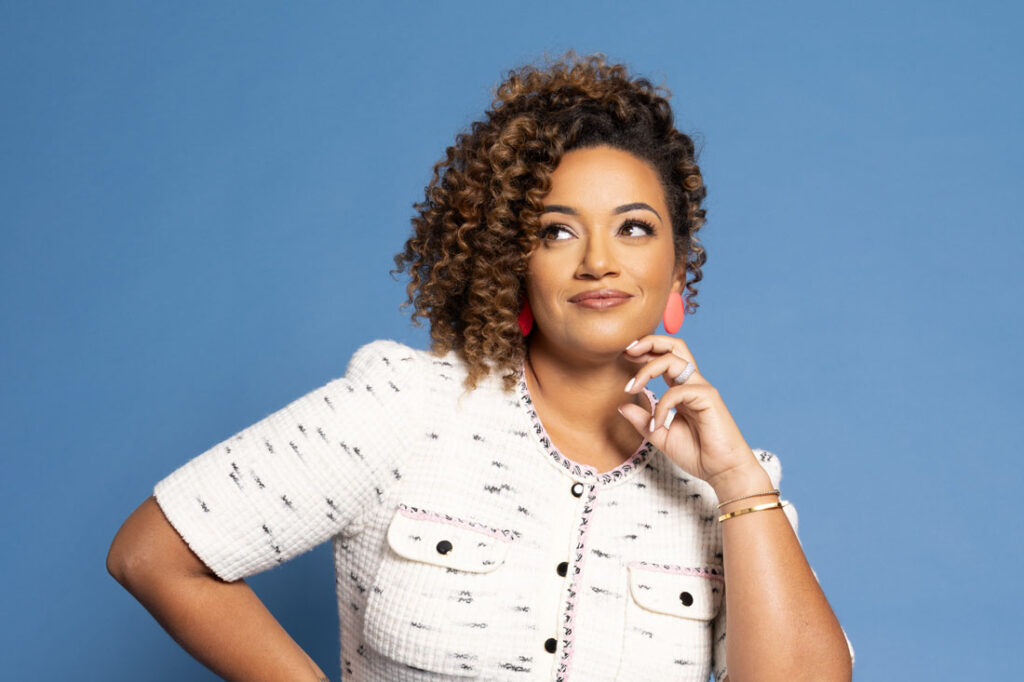It’s hard to argue with Hello Seven’s mission statement: “We should all be millionaires.” With an emphasis on all.
It’s a solid plan and one that the business coaching consultancy’s Rachel Rodgers is manifesting day in and day out. With all the talk about leaning into a career, Rodgers is teaching professionals how to lean into their worth—especially groups such as women, people of color, LGBTQ+ people and people with disabilities. When it comes to earning six figures, men are earning those salaries more often than women. Only 6% of women earn six figures, compared to 13% of men, according to a 2019 YouGov survey of more than 2,000 people. For Black women and other people of color, the statistics are even worse.
Rodgers, CEO and founder of Hello Seven, is not just helping people make the most of their capacity for earning—she is leading the millionaire movement. It’s her mission to teach diverse entrepreneurs how to make more money and build real, life-changing wealth.
Never having to worry about money may be the most beneficial way to look at your own value. Because it’s not just about the luxury of indulgence—it’s about the luxury of security. There’s so much freedom in having that security. And it comes from having a clear-cut vision, determining what that vision will cost and assessing your existing skill set to help you navigate your way there.

Q&A with Rachel Rodgers
SUCCESS: Before we talk about the origin of Hello Seven, what were you doing before you launched the business coaching firm?
Rachel Rodgers: I was a lawyer. I went to law school, and then I read The 4-Hour Workweek: Escape 9-5, Live Anywhere, and Join the New Rich by Tim Ferriss. It was all about, like, how to work online or start your own business and have flexibility. That sounded very appealing because working at a law firm wasn’t what I thought it would be.
S: So, then, what kind of job did you land after law school?
RR: I was looking at different places to work, but this was during the 2008 recession, so there were more lawyers graduating than there were actual jobs. That led me to wanting to do my own thing. I had a clerkship lined up with a judge, and at the end of 2010, when my clerkship ended, I started my own law practice. I had a license to practice law, and I’d spent a lot of money to get it. I just asked myself, ‘How could I show up differently?’
S: The salary jump from law clerk to private practice lawyer had to be significant. And, then, from that to a seven-figure business. Was all of that more of a slow climb or overnight sensation?
RR: Definitely a slow climb, because I was figuring it out as I went. It’s not like I had a mentor. If I had had the me that I am now, it would’ve been faster… I didn’t necessarily want to build a million-dollar business when I started. I just wanted to replace my $41,000 salary. My first year in my own law practice, I made $65,000. But by the end of 2013, I made $300,000. When I wasn’t working with clients, I was doing all of these marketing activities. It all starts to come to a head when all of your efforts start to work together.
S: What was an important part of your marketing strategy?
RR: I created a product, and this was critical. I would talk to entrepreneurs all day long, but a lot of them could not afford me. A lot of them had lost their jobs because of the recession, so I still wanted to serve them but without working for free. So, I created a digital product that was a guide to running your business from a legal perspective. It was 10 chapters called Small Business Bodyguard. I launched that in July 2013… [and] earned $80,000. And, then, it just kept selling. I was earning a 90% profit every time it sold. The following year, I almost doubled revenue again. By the time I stopped practicing law, I was making around $700,000 a year.
S: So, you left the law behind for this new mentor role. How did you know it would be profitable?
RR: My legal clients were asking me how I was getting my practice to grow so fast. I didn’t even realize I was good at it…. And I wanted to share that with everyone who was asking, but then a mentor of mine told me to stop giving it away. I started charging for this business coaching side hustle, and my clients were very successful. Before I knew it, I was able to wind down my law practice and wind up my business coaching. I offered one-on-one coaching packages, retreats and events. I exhausted myself, though, and I realized I needed to streamline so that I was only offering a few services related to intellectual property.
S: At what point did you realize that it was women and people of color who were not getting to millionaire status as quickly as men?
RR: I was actually focused on the underserved category even in my law practice. So, I already knew that a lot of the people who were getting laid off were [white] women and women of color. And I remember coming across a stat that said that most women-owned businesses will never make more than $50,000 a year. I was horrified. I was like, “Oh, hell no.” When I watch women who have these brilliant and profitable ideas but can’t get anyone to give them a business loan, you see how there is just not as much available to them.
S: Is there a difference between making seven figures and actually being a millionaire?
RR: They are linked. If you have a business that generates a million dollars a year, even if you don’t take home a million dollars a year, you are a millionaire. The million dollars does not have to be liquid to count. If you have an asset worth a million or more, then you are very likely a millionaire.
Rachel Rodgers’ steps to success
It probably takes at least a dozen steps to get from your current net worth to your dream net worth. But you have to start somewhere. Here are Rachel Rodgers’ first three:
- Create your million-dollar vision. “It does not have to be a purely altruistic thing. I wanted to be able to pay my mom’s rent so she didn’t have to stress…. Whatever those things are that currently drive you to show up to work every day. It might be monetary, notoriety or better opportunities.”
- Monetize that vision. “What will it take to get there? Once you put a dollar amount on it, you ask yourself what you can do to make that. There are so many money-making opportunities. And if you under earn, you can start brainstorming ideas and then take action in order to train your brain. We’re conditioned to believe that we go to work, we get the paycheck and that’s it.”
- Take stock of your skill set. “What were you good at as a child? What kinds of things do people ask you to help with? What do you have degrees in? We all have secret skills. Your resume shouldn’t be about the companies you worked for, but what you did while you were there and how you were an asset to that company.”
This article originally appeared in the May/June 2024 issue of SUCCESS magazine. Photo by Dale May; Courtesy of Rachel Rodgers










